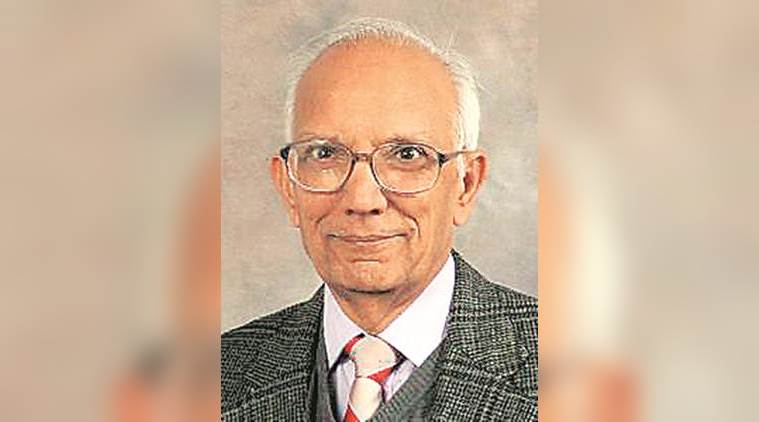- India
- International
Rattan Lal: ‘Soil a living being, can boost farm output, mitigate climate change’
Health of the soil is like the health of a human being. Soil is a bank account — you can’t withdraw more than you put in. So look after your soil.
 Rattan Lal
Rattan Lal
Professor Rattan Lal, the winner of this year’s World Food Prize — considered the equivalent of a Nobel Prize in agriculture — says we must improve our soil health to not only to boost crop productivity, and make farming profitable, but also to mitigate the effects of climate change. The founder director of the Carbon Management and Sequestration Center (CMASC) at The Ohio State University in Columbus, Ohio, the Punjab Agricultural University, Ludhiana alumnus spoke to Manraj Grewal Sharma via Skype. Excerpts:
Tell us a bit about your early years.
I am originally from Ghariyal village in Gujjaranwala district in Pakistan. After Partition, we settled in a village near Kaithal, Haryana called Rajaund. I came to Ludhiana to study at Punjab Agricultural University, from 1959 to 1963. My family is today spread across Punjab, Haryana and Delhi.
Your citation says you helped 500 million small farmers.
The research I did was focused on improving the soil health of small farmers, who number 500 million to 700 million. I undertook projects in Africa, Asia, South East Asia, South America — Columbia, Brazil, Thailand, Vietnam and many other countries.
What would you recommend for the success of small farmers?
Punjab, Haryana, and Uttar Pradesh have a large number of small farmers. For one, I would urge them not to burn the crop residue. Burning of rice straw is not good for the soil, environment, or the human health.

Second, all the crop residue should be returned to the soil. The soils in northern states are depleted of organic matter present in the top layer. This matter should comprise around 2-3 per cent of the top soil but in the highly depleted Indian soils, its percentage is about 0.1-0.2 per cent. We practice extractive farming, take away everything, and don’t use cow dung manure.
We have a rule of soil health management called the law of returns. It means whatever you take from land, you must return in some form or the other. If we remove nitrogen, phosphorus, potassium and organic matter from it, we must return it too. Health of the soil is like the health of a human being. Soil is a bank account — you can’t withdraw more than you put in. So look after your soil.
Thirdly, don’t use inputs such as fertilisers indiscriminately. Farmers often broadcast fertiliser in standing water in paddy fields. The temperature is high and most of this fertiliser will either volatilise, causing global warming, or leach into the ground, affecting our health. Inject fertiliser directly into the soil, don’t broadcast on the surface.
Fourthly, don’t use top soil for brick making. The top layer of soil has been built by nature after millions of years. Sand mining is very bad for soil. Carve out specific mining sites, don’t touch the rest of the land.
I would also request farmers not to practice flood irrigation. Just like we can’t breathe in water, nor can the organisms in the soil. Adopt drip irrigation, it saves water, and plants grow better as their roots don’t get drowned. Flood irrigation must be banned.
You believe soil is a living organism.
Yes, soil is alive with 25 per cent of all biodiversity. Did you know that antibiotics like penicillin come from microorganisms living in the soil? But we use fertilisers and pesticides indiscriminately and the soil dies. Soil must never die. It should be protected, it should be restored. Our shastras say dharti is mata. Earth should be worshipped.
Should the government help in implementing soil rights?
Yes, the government should reward farmers for ecosystem services with an equivalent of $16 a year per acre. Farmers who follow good practices, grow a crop cover and let it mulch should be rewarded. Farmers not only produce healthy food but also mitigate climate change, and improve water quality.
Health of the soil, plants, animals, environment and the humans is interconnected. If the soil health deteriorates, so does ours. The trinity of the air, water and soil make up the environment. Gurbani says pawan guru, paaani pita, and mata dharat mahat, but we don’t practice it.
What role can farmers play in mitigating climate change?
Farmers are a big stakeholder in mitigating climate change. Soils are carbon sinks — if you increase the organic matter by photosynthesising CO2 from the atmosphere and build up the organic matter in India to 2 -3 per cent in the next 20-30 years, many problems related to climate change will be alleviated. A healthy soil will protect you from flooding in the monsoon and drought in the summers.
Start the afforestation of the Shivaliks to replenish our rivers and groundwater besides putting an end to flooding and landslides.
What are your thoughts on paddy?
It should be directly seeded upland like wheat. This may bring down the yield by 5-10 per cent but farmers will save on water, puddling, and labour. There are special varieties of rice for this purpose. Also, we should find a substitute for rice in Punjab, Haryana, which are not conducive for it. Instead, grow fodder, vegetables, fruits, grapes, citrus, pistachios, almond, cotton, soyabean, chickpeas et al. Leave rice cultivation to Bengal, Bihar, Orissa and other places with humid climate.
What can the govt do to discourage paddy farming and encourage other crops without an assured MSP?
Instead of subsidy, pay eco-service charges to farmers who follow good practices. The government can help by setting up industries related to processing, storing and value-addition close to the fields. This will also generate employment for villagers who won’t need to migrate to slums in big cities. Right now we are unable to store or process our fruits and vegetables. Prices crash and farmers dump their produce. This can be stopped. As more people get absorbed into industry, the farm unit size will also increase.
Does Covid-19 present an opportunity for farming?
Covid-19 has shown that nature can recover in a very short time if you stop polluting it and adopt sustainable practices. Dip in pollution has improved the quality of our air and water. Sustainable farming has a bright future, and Covid-19 has pointed a way to it.
Farmers have always been used as an agent of food security. Shouldn’t farmers earn for themselves?
Farmers must grow things that profit them. That will improve their income. Farmers have provided food security to India, now they can look towards economic security. They should follow good agricultural practises and demand that the society compensate them. Pay them for improving water and fossil quality.
Free electricity and water should be stopped. Saanjha baap na roye koyi. It is a tragedy of the common. Anything free is misused.
What about corporatisation of agriculture?
That is a good idea and will reduce wastage. I see so much wastage of grains in govt mandis. Minimise wastage, leave the residue in soil, promote mechanisation and improve farmer profitability. Rent machinery through cooperatives to make farming profitable.
Any parting message?
I feel honoured and privileged to be from India. Our mother country has many good things. The Sanskrit term ‘vasudev kutumbakam’ has great significance in India. We must follow it in spirit. We must live in peace and harmony, and not discriminate against other on the basis of religion, caste, colour or creed. That is what our sacred Shastras decree. And that is how we must live.
Apr 25: Latest News
- 01
- 02
- 03
- 04
- 05








































